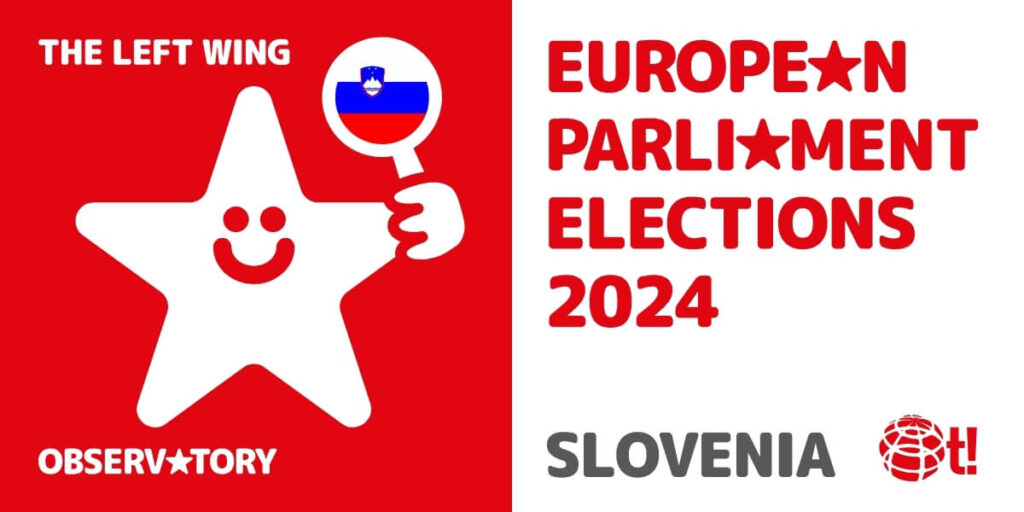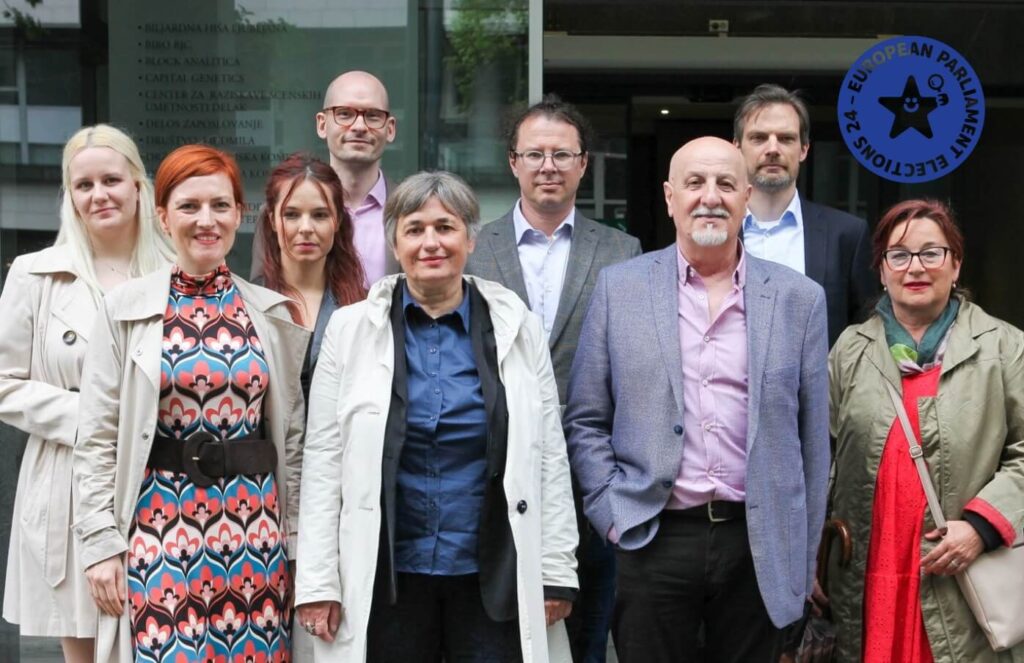
While this article is being written, there are still some significant unknowns about the 2024 EP elections in Slovenia, the biggest two being the lists of candidates of some of the parties and the possibility that referendums will be held on the day of the EP elections, which could influence the voter turnout, even though the referendums would be non-binding.
The upcoming election of Slovenian MEPs to the European Parliament on June 9 is anticipated to be a challenging one for the current ruling liberal coalition. The current government, which is led by the centrist Freedom Movement party (member of Renew Europe) and includes the Left Party (part of The Left Group & the Party of the European Left) as well as the Social Democrats (member of the Progressive Alliance of Socialists and Democrats), has been facing a steep decline in popularity since the forming of the governing coalition in 2022. The Freedom Movement is participating in its first European election with a reduced level of support, having experienced a significant decrease from its original 34% at the time of the 2022 national election. Similarly, the Social Democrats have faced a decline in popularity due to recent corruption scandals that have led to the removal of some of its party leaders. The Left Party (Levica) has also seen a decrease in its popularity, which could be linked to its unreserved backing of the government’s neoliberal and militaristic policies.
The centrist Freedom Movement, the largest party in the National Assembly and in the current government, is facing difficulties assembling its list of candidates. Specifically, it is having problems with deciding on the order of its candidates. We can attribute this to the existence of conflicts between several groups within the party, which are a consequence of the fact that the party emerged by incorporating two other liberal parties (Lista Marjana Šarca and Stranka Alenke Bratušek). Besides the names which will be on its list, the party also revealed their pick for EU Commissioner, the former president of the Court of Audit, Tomaž Vesel. The party generally stands on a pro-EU and pro-NATO platform. So far, there are no standout pledges. This may change, however, after they publish their EU manifesto.
The second political party that is part of the current government coalition, the Social Democrats, which belongs to the Progressive Alliance of Socialists and Democrats, had recently been embroiled in a scandal involving its, now former, Minister of Justice. This scandal brought division to the government and the party and also damaged its reputation in the public. The party is now trying to repair its reputation by holding a party congress and electing a new leadership. At the time this article is being written, there are no reports about their list of candidates. Much like the Freedom Movement, the Social Democrats also stand on a pro-EU and pro-NATO platform, with their programme stating that they are “for a Europe of mutual solidarity, a green, innovative, and secure Europe”.
While the initial polling for the European Elections showed rather promising results for Levica, which is part of the European Left Party and The Left in the European Parliament, subsequent polling at the national level has been disastrous for the party, placing it at 2.8%, an all-time low, well below the electoral threshold for the National Assembly, at 4%, as well as the projected percentage required for an MEP, at around 5%-6%. Levica is also notably lagging behind other parliamentary and even non-parliamentary parties in unofficial campaigning that is already underway and has yet to officially present its list of candidates and electoral programme.
One of the key issues Levica is facing in the run-up to the EP elections is differentiating itself from the centrist liberal parties of the government coalition, something that it has so far been unable (or unwilling) to do. The party has been part of the governing coalition since 2022. While the government initially promised to be a progressive, centre-left coalition that would address pressing issues such as the decaying public healthcare system, lack of public housing, military spending etc., the ruling liberal Freedom Movement Party quickly reneged on its promises and colluded with various lobbies to push austerity, pass anti-social legislation, and further increase the defence budget. The government has also failed to enact any of the major reforms planned at the beginning of its term. Pension reform, healthcare reform, public sector payment reform, housing reform and labour reform are just a few of the failed policies. So far, Levica has, for the most part, provided uncritical support for the government’s policies, while at the same time being unable to pursue the main agendas it had set itself when entering the government (labour legislation, housing). The parliamentary group has also recently attempted to expel the “leader” of the party’s left wing, Miha Kordiš, who had publicly criticised the party’s shift to the right. This was followed by further attempts by the ruling moderate faction, led by Asta Vrečko and former coordinator Luka Mesec, to purge the internal opposition. These struggles culminated in March with the defection of a significant part of the left wing from the party, giving the leadership an irreversible mandate to move the formerly socialist party into the bourgeois-liberal camp. Levica’s failure to enact left wing policies and its internal purges of the left-wing opposition should be seen as the main cause for the party’s poor standing in recent polls. However, despite shifts to the right and despite not pushing against the increased defence budget, the sending of weapons to active war zones etc. as part of the governing coalition, there are indications that Levica will attempt to take up an anti-NATO stance in the coming electoral campaign. The leading candidate for Levica will be Nataša Sukič, one of Levica’s MPs and the Vice-President of the National Assembly. The rest of the list was officially announced on 7 May and includes one of the party’s government ministers and two of its state secretaries: Luka Mesec, Minister of Labour, Family, Social Affairs and Equal Opportunities, who is running as a last-place supporting candidate, as well as Dan Juvan, State Secretary for Social Affairs, Labour and Workers’ Rights, and Luka Omladič, State Secretary at the Ministry for a Solidary Future.
The main opposition party to the current government coalition, the conservative Slovenian Democratic Party (part of the European People’s Party), is going into the elections expecting a landslide victory that could further undermine the legitimacy of the current liberal government of Slovenia. In addition to the Slovenian Democratic Party, whose programme for the EU Parliament elections will lean on anti-migrant and right-wing populist policies, the Slovenian conservative camp also includes the NSi party, also in EPP, which has the reputation of being a more moderate party on the Slovenian right, even though it is the most radical advocate of neoliberal policies out of all the parliamentary parties in Slovenia.
There will also be several smaller parties participating in the EU Parliament elections. The two most prevalent are Vesna – Green Party (European Green Party) and Resni.ca (The Truth, newly formed and unaffiliated).
Vesna – Green Party presented Vladimir Prebilič, a local mayor and former candidate for President of Slovenia, as the leader of their list. The party stated that fair taxation, solar energy, sustainable food and respect for diversity are their leading policies. It is worth noting that Prebilič, despite being portrayed as a leftist/progressive candidate, was the co-author of an anti-social legislation proposal that targeted Slovenia’s Roma population.
Resni.ca is a Eurosceptic, antivax populist party. So far, it is not part of any European party. Its president Zoran Stevanović will be the leader of their list of candidates, which includes some surprisingly recognizable names. The party will profit because of Levica’s shift to the political centre, picking up Eurosceptic and anti-NATO voters dissatisfied with the latter party.
No party alliances for the elections have been presented yet. The Slovenian Democratic Party (EPP) that formerly joined forces with the extra-parliamentary Slovenian People’s Party (EPP) is unlikely to do so again.
Cover-Photo: Levica candidates for the European elections. Source: Facebook account of Levica.



